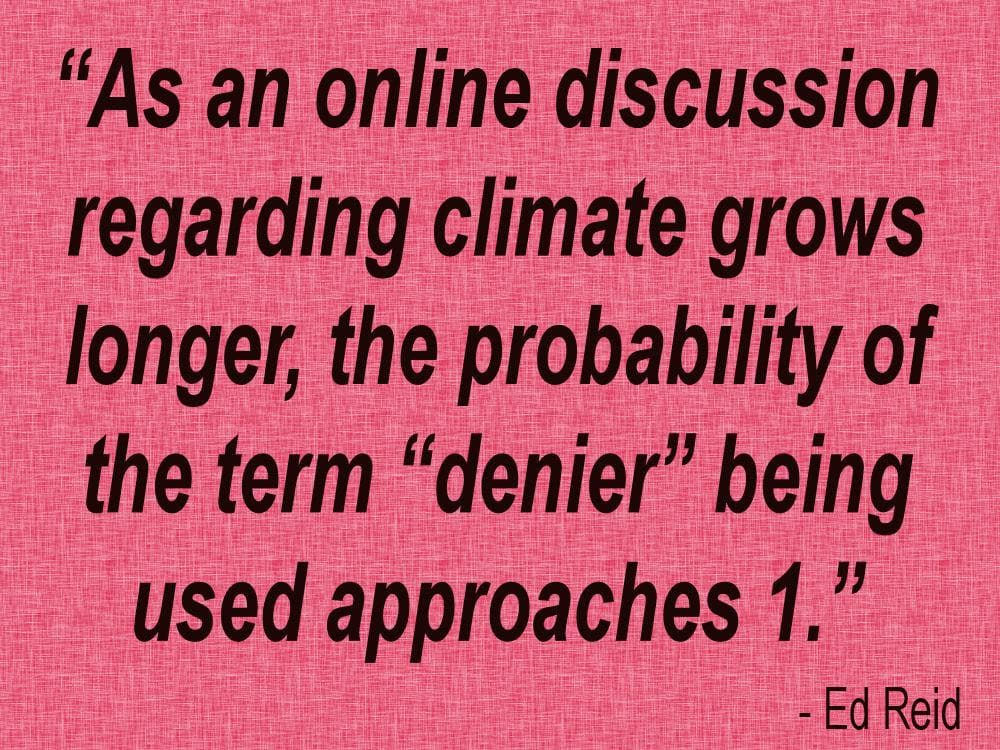Mike Godwin, a Washington, DC attorney, propounded “Godwin’s Law” in 1990.
“As an online discussion grows longer, the probability of a comparison involving Nazis or Hitler approaches 1.”
Godwin describes this as an “observational law”, based on his experiences observing and participating in online comment threads.
I hereby propound “Reid’s Law”, which is also an “observational law”; and, arguably, a corollary to Godwin’s Law.
“As an online discussion regarding climate grows longer, the probability of the term “denier” being used approaches 1.”
Reid’s Law has two corollaries:
“The less scientific and the more political a website is, the more probable it is that the term “denier” will appear in an original blog post.”
“The more liberal / progressive a media outlet is, the more probable it is that the term “denier” will appear in an original editorial, opinion piece or news story.”
A Google search of related terms produces the following results:
- 468,000 hits -- “climate denier”
- 519,000 hits -- “climate change denier”
- 184,000 hits -- “anthropogenic climate change denier”
- 114,000 hits -- “catastrophic anthropogenic climate change denier”
The term “denier” and its variants are most likely to appear in blog posts at websites such as climateprogress.org, desmogblog.org, skepticalscience.org, scienceofdoom.org, scienceblogs.com/stoat and tamino.wordpress.com. However, they also appear in RealClimate.org, the semi-official website of the scientists at the NASA Goddard Institute of Space Studies.
The term “denier” and its variants are most likely to appear in editorials, opinion pieces and news stories in outlets such as the Associated Press, Reuters, The New York Times, The Washington Post, The Los Angeles Times, The Boston Globe, The New Republic, Bloomberg, The Huffington Post, Slate, MSNBC, CNN and NPR/NET.
The expression “climate denier” is ridiculous on its face, since no person of reasonable intelligence and education believes that the earth does not have a climate. However, this term, the shortest of the variants, is the most common term used, as verified by the results of the Google searches. It is the most convenient “sound bite” or “bumper sticker” accusation. It is also the closest in form to the expression “Holocaust Denier”, which is the image those using the expression “climate denier” wish to evoke.
The expression “climate change denier” is almost equally ridiculous, since any reasonably informed adult or high school student is aware that global climate has changed over the millennia, from ice ages (glacial periods) to inter-glacial periods, such as the current Holocene period. Anyone denying that climate changes is either ignorant or being deceptive.
The expression “anthropogenic climate change denier” is far less frequently used, mostly because it is somewhat awkward and not universally understood. There are people who deny that there is any human influence on climate change, though that position is not easily defensible; and, can be disproven by conducting a relatively simple experiment.
The expression “catastrophic anthropogenic climate change denier”, the least frequently used of the various expressions according to Google, is the expression that comes closest to the reality of climate change skepticism – skepticism that the recent climate change is primarily or exclusively of human origin and would lead to a global climate catastrophe. These are the aspects of the “climate consensus” that are based exclusively on the outputs of climate models which have not been verified and have not demonstrated skill at forecasting future conditions or events.
The term “denier” and its variants have become epithets which avoid the necessity of describing the nuances of climate skepticism, while also taking advantage of the negative implications of “Holocaust Denial” to cast aspersions on those who are genuinely skeptical of the analyses and future scenarios produced by the consensed climate science community. Referring to people as “deniers”, rather than as skeptics, is an attempt to delegitimize their skepticism; and, ultimately, to delegitimize them.
Related Article:
Influence of Labeling and Incivility on Climate Change Communication
- RE: Climate Denier
